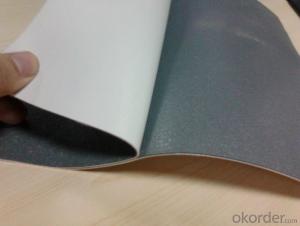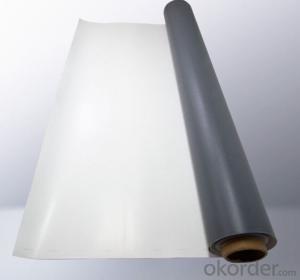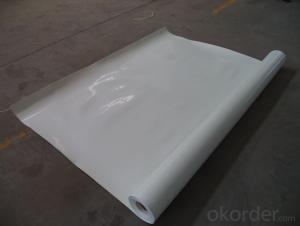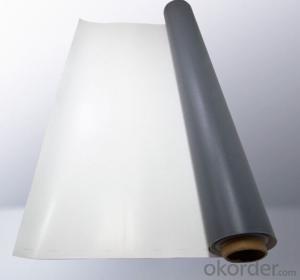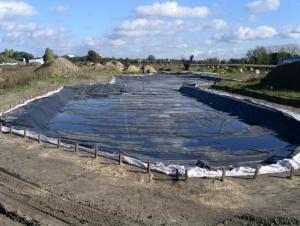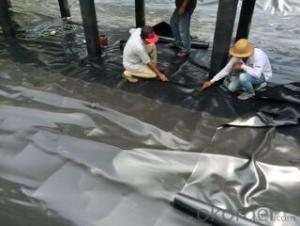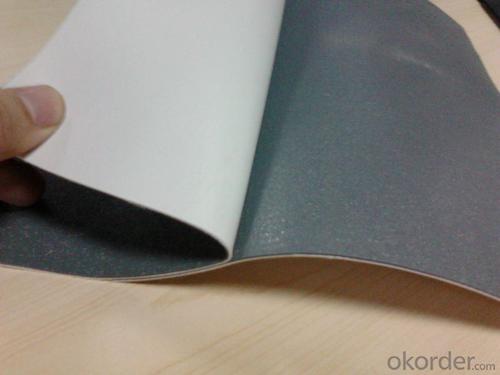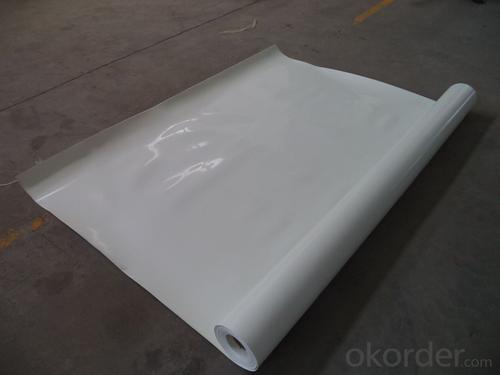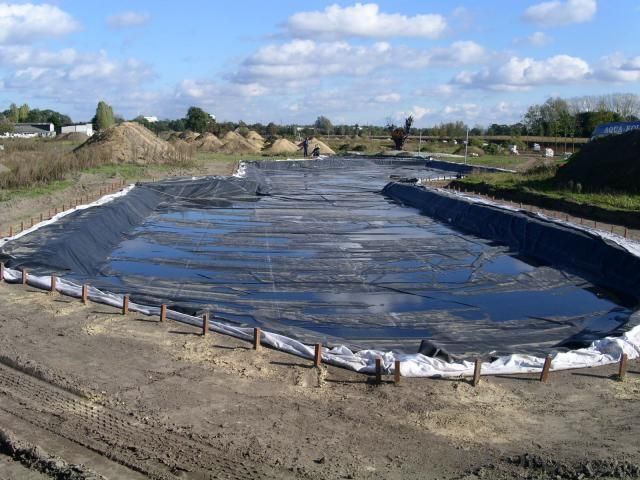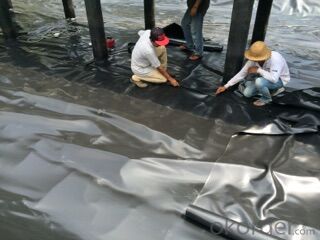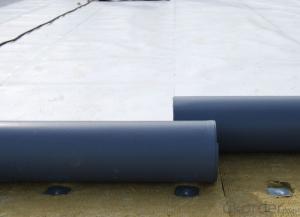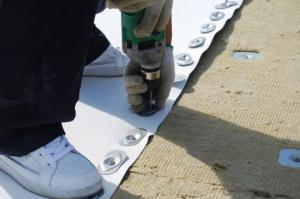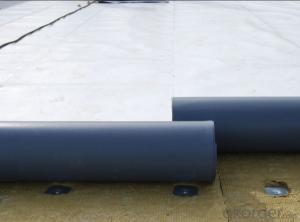TPO Waterproof Membrane for Width2.05m,Thickness 1.2mm 1.5mm 2mm
- Loading Port:
- Qingdao
- Payment Terms:
- TT or LC
- Min Order Qty:
- 1000 m²
- Supply Capability:
- 100000 m²/month
OKorder Service Pledge
OKorder Financial Service
You Might Also Like
Polyester Fleece Backing Thermoplastic Polyolefin Waterproof Membrane
Description
PMT-3020TPO is a waterproof sheet, consisting of thermoplastic polyolefin compound resin materials as the base stock, reinforced with fiber backing materials. There have two kinds of thickness: 1.2mm and 1.5mm.
Where to use
● Various roofing waterproof projects, such as industrial and civil buildings, public constructions;
● Full adhered system for concrete substrate or mechanically attached systems.
Advantages
● Weather resistance and durability;
● Excellent weld ability;
● No any crisp agents to prevent materials brittleness;
● Intermediate enhanced polyester mesh fabric to have high tensile strength, fatigue resistance and penetrating resistance suitable for
mechanically attached roofing systems;
● Excellent the same high and low temperature resistance as rubber materials which can keep flexible at -50° C and keep mechanical
strength in high temperature;
● Excellent chemical resistance to acids, bases, and restaurant exhaust emissions;
● Dimension stability;
● White-based light-color and smooth surface with high reflection, energy saving and anti-dust functions;
● Use heat welding for the seam areas to form a reliable seamless waterproof layer.
Typical properties
Item | Requirement | Test Method | ||
Thickness, min, mm | Sheet-overall | ≥1.0 | ASTM D6878 | |
Coating over fabric or scrim, weathering side only | ≥0.305 | ASTM D751 | ||
Breaking strength, min, N | ≥976 | ASTM D751 | ||
Elongation at reinforcement break, min, % | ≥15 | ASTM D751 | ||
Tensile strength,min, N | ≥245 | ASTM D751 | ||
Brittleness point, max, °C | ≤-40 | ASTM D2137 | ||
Ozone resistance | no cracks | ASTM D1149 | ||
Properties after heat aging | Breaking strength, % min | ≥90 | ASTM D573 | |
Elongation at reinforcement break, % min | ≥90 | ASTM D573 | ||
Tearing strength, % min | ≥60 | ASTM D573 | ||
Weight change (mass), max % | ≤±1 | ASTM D573 | ||
Linear dimensional change, max, % | ≤±1 | ASTM D1204 | ||
Water absorption, max, mass % | ≤±3.0 | ASTM D471 | ||
Factory seam strength, min, N | ≥290 | ASTM D751 | ||
Weather resistance | Visual inspection | - | ||
Packaging
Rolled with hard materials and packed with plastic bags or woven bags.
Thickness | Roll Size | Rolls / Pallet | Pallets / 20’ Container |
1.2 mm | 15 m2 | 25 | 20 |
20 m2 | 25 | ||
30 m2 | 25 | ||
1.5 mm | 15 m2 | 25 | |
20 m2 | 25 | ||
30 m2 | 20 |
Above quantities are indicative only. We can produce it according to your demands.
Storage
PMT-3020TPO material should be stored in well-ventilated place and avoid being exposed to the sun or rain. The temperature in stored places can not be higher than 45° C. It only can be put horizontally in five-level. It has to be avoided acid, alkali, oil and organic solvents. The shelf life is 1 year.
Transportation
PMT-3020TPO material should avoid inclination or lateral drift during transportation. When necessary, covering with felted fabric.
Application System
Yuhong not only provides TPO waterproofing membrane, but also dedicates to integrated roofing systems. Yuhong TPO single ply roofing waterproof system includes mechanically attached roofing system, fully adhered roofing system and ballasted roofing system.
Application Methods
● For Mechanically Attached Roofing System
Before application, spread TPO membranes on substrate in advance. Install TPO membranes perpendicular to steel deck ribs on the substrate without distortions according to the flange. The overlapping width is 120 mm. The minimum overlapping distance of membrane short side direction is 50 mm. Fasteners are installed according to designed position. Hot-air welding is adopted for laps with 40 mm welding width.
●For Fully Adhered Roofing System
Before application, spread TPO membranes on substrate in advance. Install TPO membranes on the substrate without distortions according to the flange. The overlapping width should be more than 50 mm. Hot-air welding is adopted for laps with 40 mm welding width. Professional adhesives need to be used on both underside and substrate surfaces to adhere and maintain.
● For Ballasted Roofing System
Before application, spread TPO membranes on substrate in advance. Install TPO membranes on the substrate without distortions according to the flange. The overlapping width should be more than 50 mm. Hot-air welding is adopted for laps with 40 mm welding width.
Attentions
● TPO membranes reflect heat and light, wearing protective clothing (long-sleeved shirt, long-barreled trousers), and wearing a filter to protect the skin and eyes from UV-induced damage.
● Security measures for roof perimeter are necessary when application. Sheet surface is slippery when wet, taking care to avoid slide.
● Sealants and adhesives are flammable containing solvents. They will be dangerous when exposure to heat, even have the possibility to catch fire and explode.
● Sealants, adhesives, cleaners should be avoided contacting with skin and eyes.
● No smoking during application.
Images of TPO Rubber Waterproof Membrane:
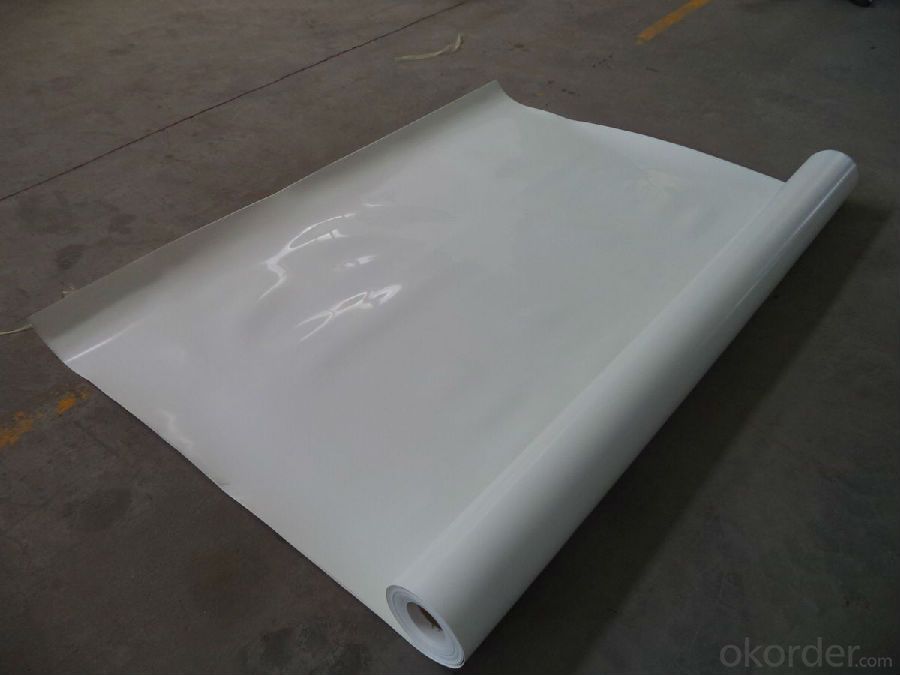
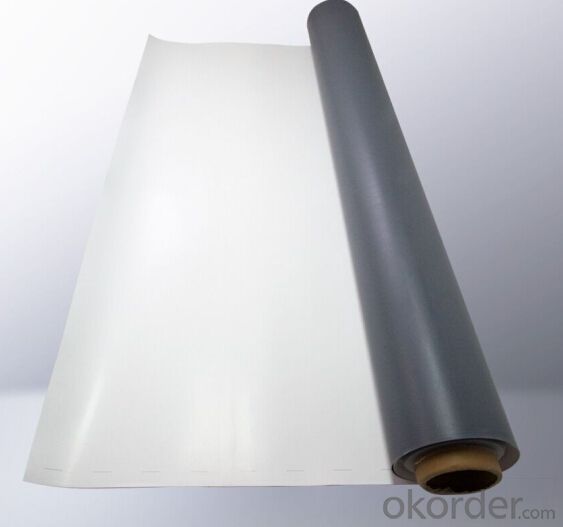
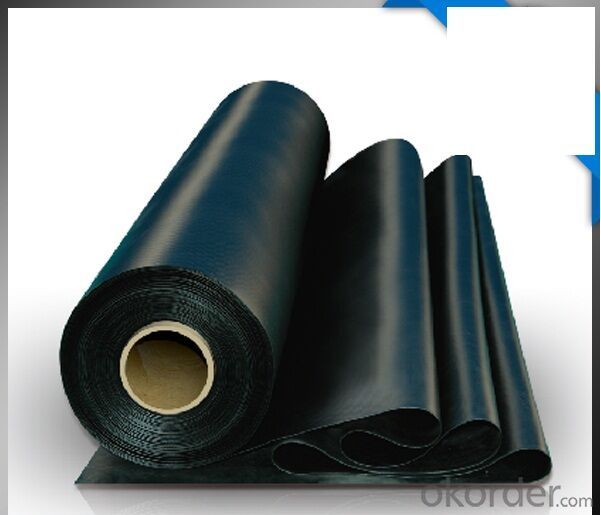
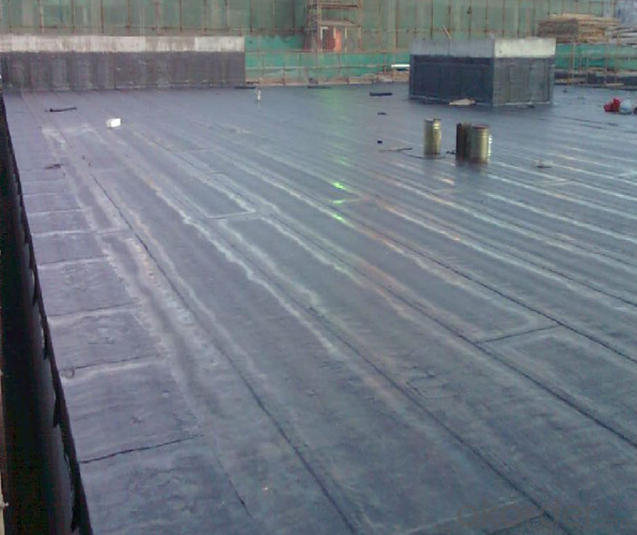
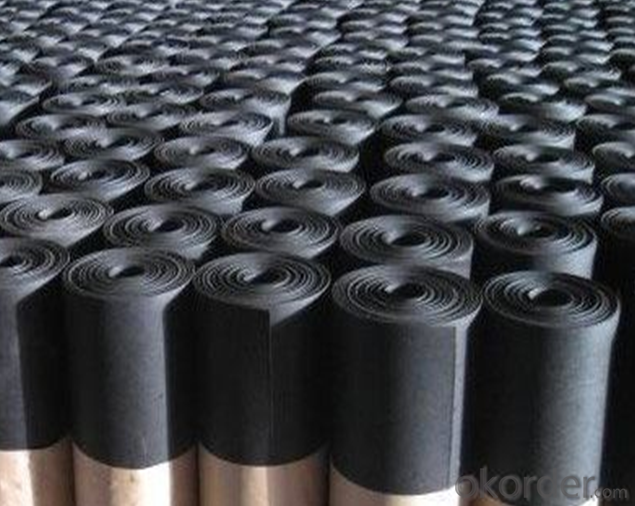
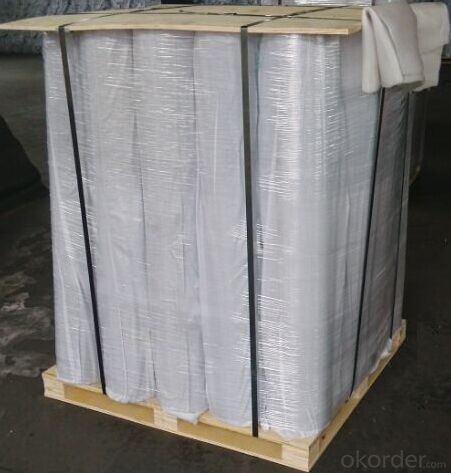
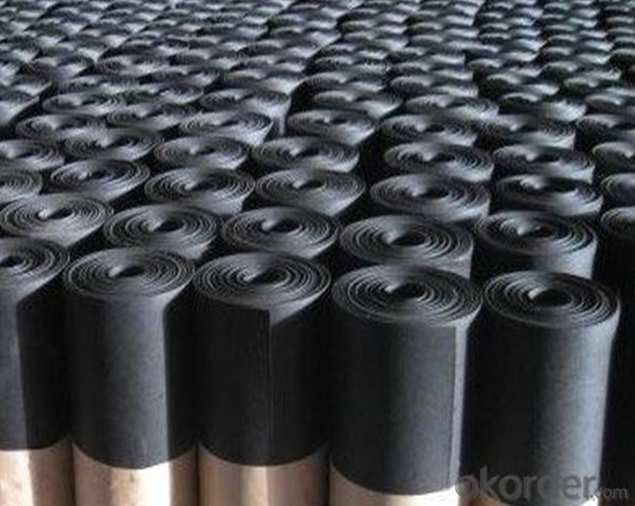
FAQ:
1. What are we supplying?
We are specialized in producing Colorful Asphalt Roof Shingle, SBS/APP modified bitumen waterproof membrane, Self adhesive bitumen waterproof membrane, PVC waterproofing membrane, EPDM rubber roofing membrane, Single Component Polyurethane Waterproof Coating, and Spray Polyurea Waterproof Coating
.
2. How Many years experience do we have?
We have been exported to more than 20 countries in the past 15 years.
3. How long do we usually reply your request?
We always reply our customer within 24 hours.
- Q: Can a waterproofing membrane be used for shopping malls or commercial buildings?
- Yes, a waterproofing membrane can be used for shopping malls or commercial buildings. Waterproofing membranes are commonly used in construction to protect the structure from water damage. They are specifically designed to create a barrier against water infiltration, preventing leaks and moisture buildup. By applying a waterproofing membrane to the building's exterior, it helps to ensure the longevity and durability of the structure. Shopping malls and commercial buildings often have large surface areas that are exposed to different weather conditions, making them susceptible to water damage. Therefore, using a waterproofing membrane is an effective solution to protect these buildings and maintain their structural integrity.
- Q: Are waterproofing membranes resistant to freeze-thaw cycles?
- Yes, waterproofing membranes are generally resistant to freeze-thaw cycles. These membranes are designed to withstand extreme weather conditions, including freezing temperatures and the subsequent thawing process. The materials used in waterproofing membranes are often chosen for their durability and ability to expand and contract without compromising their waterproofing properties. This resistance to freeze-thaw cycles ensures that the membranes remain intact and effective in preventing water penetration, even in areas where temperature fluctuations occur frequently.
- Q: Can waterproofing membranes be used on swimming pool decks?
- Yes, waterproofing membranes can be used on swimming pool decks to protect them from water damage and leaks.
- Q: Can a waterproofing membrane be used for a hospital basement?
- Yes, a waterproofing membrane can be used for a hospital basement. Waterproofing membranes are commonly used in various construction projects, including hospitals, to prevent water infiltration and protect the structure from moisture-related issues such as leaks, dampness, and mold growth. The basement of a hospital is particularly susceptible to water damage due to its below-grade location, making the use of a waterproofing membrane crucial. The membrane acts as a barrier against water seepage, effectively keeping the basement dry and preventing potential damage to the building and its contents. Additionally, a waterproofing membrane can help maintain a clean and safe environment in the hospital basement by preventing the growth of mold and other harmful microorganisms that thrive in moist conditions. Overall, the use of a waterproofing membrane in a hospital basement is highly recommended to ensure the structural integrity and safety of the building.
- Q: Can a waterproofing membrane be used on PVC roofs?
- Yes, a waterproofing membrane can be used on PVC roofs. PVC (polyvinyl chloride) roofs are commonly used in commercial and residential buildings due to their durability and resistance to weathering. However, like any roofing material, PVC roofs can develop leaks or cracks over time. Applying a waterproofing membrane can help protect the roof from water infiltration and extend its lifespan. Waterproofing membranes, such as EPDM (ethylene propylene diene terpolymer) or TPO (thermoplastic olefin), are flexible and can adhere to the PVC surface, creating a seamless and watertight barrier. It is important to ensure that the waterproofing membrane is compatible with PVC roofs and follow the manufacturer's instructions for proper installation. Regular maintenance and inspections are also recommended to identify and address any potential issues before they escalate.
- Q: Can a waterproofing membrane be covered or concealed by other finishes or materials?
- Yes, a waterproofing membrane can be covered or concealed by other finishes or materials. This is commonly done in construction projects to create a visually appealing and functional surface while still ensuring the waterproofing integrity of the structure.
- Q: Can waterproofing membranes be used on plant rooms?
- Yes, waterproofing membranes can be used on plant rooms. Plant rooms often contain equipment and machinery that require protection from water damage. Waterproofing membranes provide a barrier against water infiltration, preventing leaks and potential damage to the plant room and its contents. These membranes are typically applied to the walls, floors, and roofs of the plant room to ensure complete waterproofing. Additionally, waterproofing membranes can also offer protection against other elements such as chemicals and temperature fluctuations, making them an ideal solution for plant rooms.
- Q: About asphalt waterproofing membrane
- 3, the performance of these two materials vary widely, SBS is a common international waterproof material, and linoleum due to poor performance, aging fast, has been used in the waterproofing works. The performance standard of linoleum is GB326 "oil asphalt paper linoleum", SBS coil implementation of the standard is GB18242 "elastomer modified asphalt waterproofing membrane."
- Q: Can a waterproofing membrane be used on different types of surfaces, such as concrete, wood, or metal?
- Yes, a waterproofing membrane can be used on different types of surfaces including concrete, wood, and metal. Waterproofing membranes are designed to provide a protective barrier against moisture and can adhere to various surfaces, ensuring effective waterproofing regardless of the material.
- Q: Can a waterproofing membrane be used in conjunction with flooring materials?
- Yes, a waterproofing membrane can be used in conjunction with flooring materials. In fact, it is often recommended to use a waterproofing membrane when installing certain types of flooring, such as in wet areas like bathrooms, kitchens, or basements. A waterproofing membrane acts as a barrier against moisture, preventing water from seeping through and damaging the flooring material or the subfloor. It helps to protect the flooring from leaks, spills, or even excessive moisture in the air. By using a waterproofing membrane, you can ensure the longevity and durability of your flooring, while also maintaining a waterproof and moisture-resistant environment.
Send your message to us
TPO Waterproof Membrane for Width2.05m,Thickness 1.2mm 1.5mm 2mm
- Loading Port:
- Qingdao
- Payment Terms:
- TT or LC
- Min Order Qty:
- 1000 m²
- Supply Capability:
- 100000 m²/month
OKorder Service Pledge
OKorder Financial Service
Similar products
Hot products
Hot Searches
Related keywords
